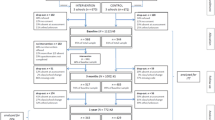Abstract
Further understanding of educators’ views of eating disorder prevention can further engage them in this effort. No previous studies of educators have used acceptability methodology or compared eating disorder prevention to other prevention efforts. Educators (n = 135) rated the acceptability of five sample programs and provided their opinions about eating disorder and other prevention programs. The results indicated primarily psychoeducational and general well-being programs were most acceptable. Educators-specified trained professionals should implement programs during school hours to male and female junior high students. Although eating disorder prevention was perceived as important, it was not rated as vital as other programs, such as substance abuse prevention.
Similar content being viewed by others
References
Neumark-Sztainer D, Story M, Coller T (1999) Perceptions of secondary school staff toward the implementation of school-based activities to prevent weight-related disorders: a needs assessment. Am J Health Promot 13:153–156
Yager Z, O’Dea JA (2005) The role of teachers and other educators in the prevention of eating disorders and child obesity: what are the issues? Eat Disord 13:261–278
Piran N (2004) Teachers: on “being” (rather than “doing”) prevention. Eat Disord 12:1–9
Smolak L, Harris B, Levine MP, Shisslak CM (2001) Teachers: the forgotten influence on the success of prevention programs. Eat Disord 9:261–265
Franko DL (2001) Rethinking prevention efforts in eating disorders: commentary on “Development and Implementation of the Body Logic Program for Adolescents”. Cogn Behav Pract 8:265–270
Varnado-Sullivan PJ, Zucker N, Williamson DA, Reas D, Thaw J, Netemeyer S (2001) Development and implementation of the body logic program for adolescents: a two-stage prevention program for eating disorders. Cogn Behav Pract 8:248–259
Levine MP, Smolak L, Schermer F (1996) Media analysis and resistance by elementary school children in the primary prevention of eating problems. Eat Disord 4:310–322
Dalle Grave R, De Luca L, Campello G (2001) Middle school primary prevention program for eating disorders: a controlled study with a twelve month follow-up. Eat Disord 9:327–337
O’Dea J, Maloney D (2000) Preventing eating and body image problems in children and adolescents using the health promoting schools framework. J Sch Health 70(18–21):2000
Mann T, Nolen-Hoeksema S, Huang K, Burgard D, Wright A, Hanson K (1997) Are two interventions worse than none? Joint primary and secondary prevention of eating disorders in college females. Health Psychol 16:215–225
Schwartz MB, Thomas JJ, Bohan KM, Vartanian LR (2007) Intended and unintended effects of an eating disorder educational program: impact of presenter identity. Int J Eat Disord 40:187–192
Neumark-Sztainer D, Levine MP, Paxton SJ, Smolak L, Piran N, Wertheim EH (2006) Prevention of body dissatisfaction and disordered eating: what next? Eat Disord 14:265–285
Stice E, Shaw H (2004) Eating disorder prevention programs: a meta-analytic review. Psychol Bull 130:206–227
Fingeret MC, Warren CS, Cepeda-Benito A, Gleaves DH (2006) Eating disorder prevention research: a meta-analysis. Eat Disorder 14:191–213
Kazdin AE (1981) Acceptability of child treatment techniques: the influence of treatment efficacy and adverse side effects. Behav Ther 12:493–506
Reimers TM, Wacker DP, Cooper LJ, DeRaad AO (1992) Clinical evaluation of the variables associated with treatment acceptability and their relation to compliance. Behav Disorder 18:67–76
Reimers TM, Wacker DP, Cooper LJ, DeRaad AO (1992) Acceptability of behavioral treatments for children: analog and naturalistic evaluations by parents. Sch Psychol Rev 21:628–643
Allinder RM, Oats RG (1997) Effects of acceptability on teachers’ implementation of curriculum-based measurement and student achievement in mathematics computation. Rem Spec Educ 18:113–120
Miltenberger RG (1990) Assessment of treatment acceptability: a review of the literature. Top Early Child Spec 10:24–38
Varnado-Sullivan PJ, Horton RA (2006) Acceptability of programs for the prevention of eating disorders. J Clin Psychol 62:687–703
Weissberg RP, Kumpfer KL, Seligman MEP (2003) Prevention that works for children and youth: an introduction. Am Psychol 58:425–432
O’Dea J, Abraham S (2000) Improving the body image, eating attitudes, and behaviors of young male and female adolescents: a new educational approach that focuses on self-esteem. Int J Eat Disord 28:43–57
Kelley ML, Heffer RW, Gresham FM, Elliot SN (1989) Development of a modified treatment evaluation inventory. J Psychopathol Behav 11:235–247
Conflict of interest
The authors declare that they have no conflict of interest.
Author information
Authors and Affiliations
Corresponding author
Rights and permissions
About this article
Cite this article
Varnado-Sullivan, P.J., Parr, F., O’Grady, M.A. et al. Educators’ views of eating disorder prevention programs. Eat Weight Disord 18, 143–150 (2013). https://doi.org/10.1007/s40519-013-0028-9
Received:
Accepted:
Published:
Issue Date:
DOI: https://doi.org/10.1007/s40519-013-0028-9




